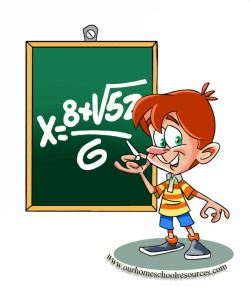Homeschool Math Curriculum for 7th Grade
A homeschool math curriculum for 7th grade provides:
- A clear and systematic pathway for learning.
- Ensuring that topics are covered in a logical order.
- Building from foundational to more advanced concepts.
Inadvertently missing or overlooking key topics can be accessible without a set curriculum. A curriculum ensures all vital areas of math are covered.
Here is a sample homeschool math curriculum for 7th grade
Week 1-2: Number Systems
- Explore rational numbers.
- Perform mathematical operations with negative numbers.
- Locate and position integers and other rational numbers on a number line.
Week 3-4: Advanced Operations with Rational Numbers
- Solve mathematical and real-life problems involving the four operations with rational numbers.
Week 5-6: Algebraic Expressions
- Generate equivalent expressions.
- Understand properties of operations.
- Factor and expand linear expressions.
Week 7-8: Linear Equations and Inequalities
- Solve one- and two-step equations and inequalities.
- Graph solutions on number lines.
- Interpret and solve word problems using algebraic methods.
Week 9-10: Ratios and Proportional Relationships
- Analyze proportional relationships.
- Solve real-world ratio problems, including percentage, rate, and part/whole.
Week 11-12: Scale and Proportions in Geometry
- Scale drawings of geometric figures.
- Solve problems involving scale.
Week 13-14: Introduction to Statistics
- Understand and use measures of central tendency (mean, median, mode).
- Analyze and interpret various data displays, such as box and line plots.
Week 15-16: Probability
- Predict and compare the probability of events.
- Understand and compute probabilities of compound events.
Week 17-18: Geometry - Circles
- Understand and use terms related to circles: radius, diameter, circumference.
- Solve problems involving the area and circumference of circles.

Week 19-20: Geometry - 3D Figures
- Understand volume formulas.
- Compute volume for prisms, cylinders, and pyramids.
Week 21-22: Geometry - 2D Figures
- Understand relationships between angles (complementary, supplementary, vertical).
- Solve problems involving these relationships.
Week 23-24: Advanced Algebra
- Understand and apply the distributive property.
- Recognize and factor the difference between two squares.
Week 25-26: Advanced Equations and Inequalities
- Solve multi-step equations and inequalities.
- Explore equations with variables on both sides.
Week 27-28: Geometry - Transformations
- Understand and describe the effects of rotations, reflections, translations, and dilations.
- Identify and draw lines of symmetry.
Week 29-30: Introduction to Functions
- Understand the concept of functions and their notations.
- Recognize functions from tables, graphs, and equations.
Week 31-32: Advanced Statistics
- Use random sampling to make predictions.
- Compare two data sets.
Week 33-34: Real-life Applications and Problem Solving
- Engage in various math projects or challenges that integrate multiple areas of math.
Week 35: Review
- Revisit critical concepts and topics from the year, reinforcing challenge areas.
Week 36: End-of-Year Assessment and Celebration
- Take an informal assessment or engage in review games to gauge understanding of the year's concepts.
- Celebrate progress and achievements.
This is a generalized outline, and the pacing and depth of topics may need adjustments based on individual student needs, prior knowledge, and specific curriculum resources you're using.

Homeschool Math Curriculum
Homeschool Math Curriculum for Kindergarten
Homeschool Math Curriculum for 1st grade
Homeschool Math Curriculum for 2nd grade
Homeschool Math Curriculum for 3rd grade
Homeschool Math Curriculum for 4th grade
Homeschool Math Curriculum for 5th grade
Homeschool Math Curriculum for 6th grade
Homeschool Math Curriculum for 7th grade








